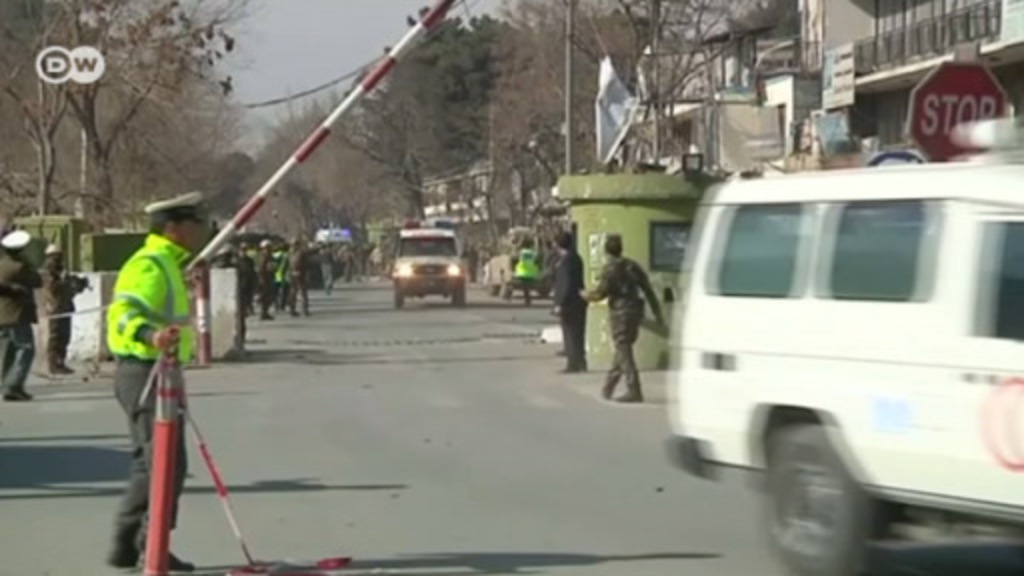At least 40 people have been killed and 140 others wounded by a bomb attack in the Afghan capital of Kabul, according to an Afghan Health Ministry official.
The attack happened near the old interior ministry building in an area known for housing the European Union's headquarters in Afghanistan and other diplomatic missions, demonstrating how militant groups can reach even secure areas of the capital.
Read more: 'The consequences of failure in Afghanistan will reach Germany,' says Hamid Karzai
'Massacre'
- A suicide bomber filled an ambulance with explosives and detonated them upon arriving at a police checkpoint.
- Aid workers described the attack as a "massacre."
- The Taliban issued a statement claiming responsibility for the attack, saying it had targeted a police convoy in the area.
- Last week, the militant group laid siege to the Intercontinental Hotel, killing at 20 people, including 14 foreign nationals.
-
The endless battle for power in Afghanistan
Militants target Kabul's safest area
A massive truck bomb killed at least 90 people in the Afghan capital, Kabul, on May 31, 2017. The target of the attack was Kabul's heavily fortified diplomatic area in the "Green Zone." The German Embassy in the area was extensively damaged. No group claimed responsibility for the attack, but the Taliban and the self-styled "Islamic State" (IS) have staged large attacks in the city in the past.
-
The endless battle for power in Afghanistan
A long series of attacks
The blast in Kabul's diplomatic enclave was the latest in a long line of attacks on the Afghan capital. Earlier in May, eight foreign soldiers were killed in a bomb attack claimed by IS. In March, insurgents attacked an Afghan military hospital in Kabul's diplomatic district, killing 38 people and injuring more than 70 others, namely patients, doctors and nurses.
-
The endless battle for power in Afghanistan
Spring offensive
In April, Afghanistan's Taliban vowed to ramp up assaults on coalition and Afghan security forces, announcing the start of their annual spring offensive. The group said they were changing tactics for this year's operation, naming it "Operation Mansour" after the group's late leader who was killed in 2016 in a US drone strike.
-
The endless battle for power in Afghanistan
Trump's Afghanistan policy
US President Donald Trump has yet to announce his Afghanistan policy. Afghanistan expert Michael Kugleman told DW Trump's Afghanistan policy will in many ways be quite similar to that of the Obama administration. "Like Obama, Trump will likely also express support for the idea of reconciliation between the Taliban and the Afghan government," said Kugelman.
-
The endless battle for power in Afghanistan
Afghan peace process
But the Taliban have shown no interest in peace talks. Afghanistan observers say it is unlikely that the militant group will engage in any negotiations as they currently have the upper hand on the battleground. The Islamists now control more Afghan districts than at any other time since 2001.
-
The endless battle for power in Afghanistan
Pakistani support
President Ghani said last year his country "no longer expects Pakistan to bring the Taliban to the negotiating table." Experts say Islamabad uses Taliban militants as proxy jihadists to counter Indian influence in Afghanistan. Former Pakistani Taliban spokesman, Ehsanullah Ehsan (pictured), was recently captured and pardoned by Islamabad after he accused India of supporting the Taliban.
-
The endless battle for power in Afghanistan
Role of the warlords
Apart from the Taliban, the Afghan warlords excercise massive influence in the country. Earlier in May, Hizb-i-Islami leader Gulbuddin Hekmatyar returned to Kabul after a 20-year exile to play an active role in Afghan politics. In September 2016, the Afghan government signed a deal with Hekmatyar in the hope that other warlords and militant groups would seek better ties with Kabul.
-
The endless battle for power in Afghanistan
Russian interest in Afghanistan
Russia has increased its involvement in Afghanistan. Moscow had maintained an apparent distance from the Afghan conflict for many years but a new geopolitical situation is emerging in the region, and it seems that Russia has decided not to remain "neutral" in the protracted conflict. In the past few months, Russia has hosted a number of Afghanistan conferences involving China, Pakistan and Iran.
-
The endless battle for power in Afghanistan
An inefficient government
In the midst of an endless battle for power, President Ghani's approval ratings continue to plummet. Rampant corruption in the Afghan government and a long tug-of-war within the US-brokered national unity government has had a negative impact on the government's efforts to eradicate terrorism.
Author: Shamil Shams
Interior Ministry deputy spokesman Nasrat Rahimi told AFP news agency: "The suicide bomber used an ambulance to pass through the checkpoints. He passed through the first check point saying he was taking a patient to Jamuriate hospital and at the second checkpoint he was recognized and blew his explosive-laden car."
Hassina Safi of the High Peace Council, charged with negotiations with the Taliban, told AFP: "It targeted our checkpoint. It was really huge – all our windows are broken … So far we don't have any reports if any of our members are wounded or killed."
An EU official said the bloc's Afghanistan delegation were in their "safe room," adding that they did not suffer any casualties.
Why does the Taliban target security forces: The Taliban launched an insurgency in the wake of the US-led invasion of Afghanistan in 2001 seeking to force out international forces and topple the government Western-backed government.
ls/rc (AP, dpa, Reuters)


















